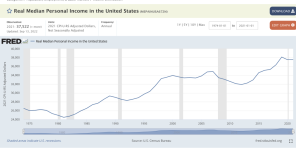You don't have to be an economist to know that trickle down theory hasn't worked the past decades and was a ridiculous idea to begin with.
Yet the median American wage vs. just about any cost real humans have has gone down. (vs. housing costs, food prices, educational prices, childcare costs, and any other metric.) Which shows that the wealth absolutely hasn't "trickled down" to normal Americans.
The metric you chose, and you likely did this intentionally, has no correlation to the wealth and well being of middle and lower class Americans. No one will argue with you the rich have gotten richer the past 4 decades, but the argument for trickle down economics is that by showering the rich with more money, it'll magically makes its way down to the rest of us, which it hasn't. The wealthy hoard their wealth, send it overseas or spend it on luxury goods that benefit other rich people.
Trump and the Republicans gave away massive amounts of free money to the ultra rich and business owners, and we haven't seen that money either. Their tax cuts were permanent, while the tax cuts that were supposed to help the middle class had an expiration date. This was a sleezy tactic to make middle class Americans think they were getting a substantial share of the tax cuts when they weren't.
Further, the last couple of republican presidents have left office with massive deficits, and it's always left to the democrats to be the adults and get the budget back in order.

